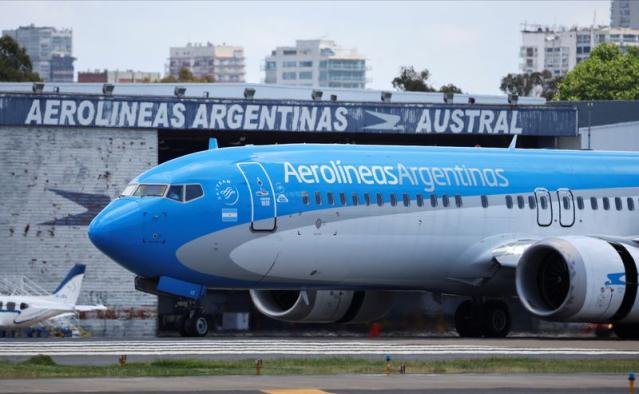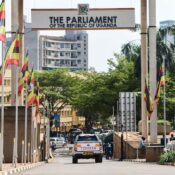
Argentina’s governmental airline reduces employees, routes, and benefits for passengers in anticipation of a potential sale
Aerolineas Argentinas, the state airline of Argentina, is in the process of restructuring in preparation for a potential sale. This includes the elimination of 13% of its workforce, the reduction of revenue-generating domestic routes, and the elimination of refreshments that were previously available to passengers, according to sources and documents reviewed by Reuters.
A significant number of the reductions, which were previously unreported, are part of a covert effort to reduce the airline’s burden on the state and attract private investment. Despite the opposition that libertarian President Javier Milei’s attempt to privatize the company has faced, the initiative is advancing.
The carrier, which is adorned with the blue and white colors of Argentina, is a significant test case for Milei’s pro-market reforms, which are reorienting South America’s second-largest economy in a drastically different direction after years of excessive government intervention. However, they have impeded economic growth and increased destitution, despite the fact that they have enhanced the state’s finances.
The memo regarding the airline’s plans to streamline it for sale was reviewed by Reuters, which also interviewed 10 company executives, officials, pilots, airline workers, and union members.
A senior company source stated that the initiative resulted in Aerolineas achieving exceptional operational results in 2024, prior to the airline’s imminent release of its full-year results next week. Part of this is indicative of the double-digit reduction in personnel that was specified in the previous document that was viewed by Reuters.
The senior source stated, “Our responsibility is to ensure that Aerolineas is in order.” They also stated that the carrier was striving to operate more similarly to its private counterparts.
“That way, when the time comes and the government enables its sale, the company is more attractive.”
In July, Aerolineas achieved profitability for the first time in seven years, according to data disclosed to Reuters.
Milei, a brazen economist, assumed office in late 2023 with the intention of transform Argentina’s subsidy-heavy economy through “chainsaw” cuts.
Although he has encountered opposition in Congress regarding the complete privatization of Aerolineas, he remains resolute in his intent to implement his proposals. Should the airline fail to undergo privatization, his government has issued a threat to terminate its operations.
Milei informed local radio in November that the facility would either be privatized or closed in order to reduce the deficit. However, it would not remain under government control.
The administration asserts that the airline has drained the government’s finances by $8 billion since 2008, when it was once again placed under state control following a previous privatization in the early 1990s under Milei’s idol, then-President Carlos Menem.
There was no response to requests for comment from Aerolineas, which was deferred by the transport secretariat.
Labor is our sole weapon.
According to six airline employees who spoke with Reuters, the company’s efforts to optimize operations include the elimination of loss-making routes, the suspension of wages, the establishment of buyout programs, and the termination of contract workers. However, even the most modest culinary selection for passengers was subject to elimination.
According to a senior airline source, the airline has reduced its in-flight snack selection, resulting in a savings of over $500,000 annually. This decision was inspired by American Airlines, which in the 1980s notoriously removed an olive from each salad served in first class in order to reduce expenses.
Currently, Aerolineas provides only one dessert in executive class and has discontinued the cereal buffet for economy passengers, according to a senior company source.
Unions and Milei’s political opponents have responded by staging protests at major airports in recent months, which have resulted in flight cancellations and delays. In December, the opposition governor of Buenos Aires province declared that he would strongly oppose any attempt at privatization.
“Our labor is the sole weapon we possess,” declared veteran Aerolineas pilot Juan Pablo Mazzieri, who proudly displays a tattoo of the airline’s insignia, an Andean condor, on his shoulder. “We don’t like doing it, but we’re going to cause delays and cancellations.”
Milei makes the argument that the carrier must enhance its competitiveness. His administration sought to de-regulate the sector by enabling low-cost carriers to expand their operations and implementing a “open skies” policy to invite foreign competitors to enter the market.
JUDICIAL ADVOCATES
The sale of Aerolineas in a single transaction has been recommended by Milei. Indeed, Fabian Lombardo, the CEO of the company, disclosed to local radio that numerous international airlines had expressed interest. According to sources, so far, those discussions have been informal.
The only contender to publicly proclaim interest is Abra Group, a holding company that controls Avianca in Colombia and Gol in Brazil (GOLL4.SA).
Joe Mohan, Abra’s chief commercial officer, disclosed at an industry conference in Dallas in November that the company is still in the process of undertaking due diligence and that the precise nature of an Aerolineas acquisition is uncertain.
Analysts warn that Aerolineas may be difficult to sell.
“It would be more convenient for an individual to participate with a percentage (stake),” stated the senior source at Aerolineas, referencing the intentions of the German airline Lufthansa (LHAG.DE), which has initiated a new process to acquire a 41% stake in the Italian state carrier ITA.
Nevertheless, the source indicates that Aerolineas has not yet enlisted the assistance of banks and advisers, as it requires additional clarification regarding the government’s plans.
“Plan B” for Milei may involve the sale of the airline to its employees, which would relieve him of both the financial burden of the company and its combative employees. Aerolineas has reported that the labor disputes have resulted in a loss of millions of dollars.
The government has alleged that the company has revoked employee benefits, including free flights, payment for commuting time, dollar-based incentives, and additional holidays, which were being provided at the expense of impoverished Argentines.
However, numerous union leaders contend that the idea of employees assuming control of the company was unfeasible.
In a nation that spans from the Antarctic to tropical forest in the north and is five times the size of France, the unions contend that Aerolineas serves a social purpose outside of its balance sheet. There are few transportation connections, and its communities are dispersed.
According to data, domestic travel in Argentina has decreased by 9% since the implementation of the cutbacks, which included a government subsidy on plane tickets.
“The number of flights we conducted last year is almost half of what we are currently experiencing,” stated Marcelo Austi, a gate agent for Aerolineas at the Aeroparque airport in Buenos Aires. “That’s an enormous difference.”
All Categories
Recent Posts
Tags
+13162306000
zoneyetu@yahoo.com



